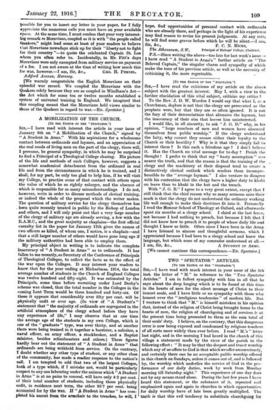[To THB EDITOR OF THH " SPECTATOR."'
Six,—I have read the criticisms of my article on the above subject with the greatest interest. May I, with a view to the further elucidation of this vital subject, criticize my critics ?
To the Rev: J. D. W. Worden I would say that what I, as a Churchman, deplore is not that the clergy are persecuted as the prophets were, but that they are so often ignored. It is not the fury of their denunciations that alienates the layman, but the inaccuracy of their aim that leaves him uninterested.
I would like, in all sincerity, to ask " J. G. D." why, in his opinion, " large numbers of men and women have absented themselves from public worship." If the clergy understand the laity, why cannot they arouse either their loyalty to the Church or their hostility ? Why is it that they simply fail to interest them ? Is this such a frivolous age ? I don't believe it. Has the Church no vital message for to-day ? Perish the thought ! I prefer to think that my " hasty assumption " was nearer the truth, and that the reason is that the training of the clergy and the machinery at their disposal tend to create a- distinctively clerical outlook which renders them incompre- hensible to the " average layman." I also venture to disagree with his contention that the clergy have a higher duty to khaki on leave than to khaki in the but and the trench.
With " J. G. B." I agree to a very great extent, except that I still think that the chief reason why so many sermons miss their mark is that the clergy do not understand the ordinary working life well enough to make their doctrines fit into it. Personally I read the Honour School of Theology at Oxford, and afterwards spent six months at a clergy school. I shied at the last fence, not because I had nothing to preach, but because I felt that I did not know how to preach it to people of whose daily life and thought I knew so little. Often since I have been in the Army I have listened to sincere and thoughtful sermons, which I appreciated because I had been to a clergy school and knew the language, but which none of my comrades understood at all.—


































 Previous page
Previous page